Viewpoint: Christmas is not for trivialising war
- Published
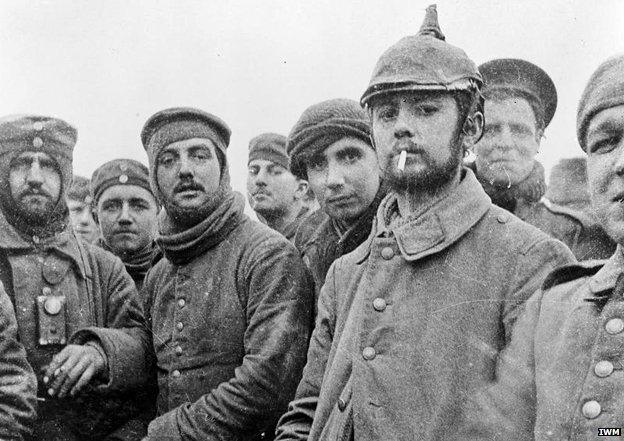
The UK may be busy commemorating the Christmas Truce of 1914, when soldiers on the WW1 front line briefly made friends with the enemy, but few Germans have heard of it - and most would be startled to see it dramatised in a TV ad, writes Sebastian Borger of Berliner Zeitung.
Whatever else their experience of living in Britain, most Germans here share one thing: an astonishment at the extent to which military traditions have survived in modern British society - and, at least to my mind, go more or less unchallenged. The military top brass is regularly seen and heard on the media. Retired generals and admirals have seats in the House of Lords and take an active part in public debate. That would be completely unthinkable in Germany.
Don't get me wrong - I think there are very good aspects to a healthy respect for the armed forces. The British people seem to have an instinctive understanding for the truism that even today there are situations when an armed and determined aggressor needs to be confronted not just with warning words but with force if necessary. That truism has largely disappeared from German discourse, as has respect for the armed forces. I see that as a mistake.
On the other hand, I find that a lot of the necessarily bloody work that soldiers do is often being trivialised. The constant talk of "heroes" and "sacrifices" is alien to me. It cheapens the concept.
The latest example of the trivialisation of war is Sainsbury's re-enactment of the famous Christmas truce of 1914 - famous, that is, in Britain. Few Germans have heard of it, let alone spent much time thinking about it. Whereas here we have endless newspaper columns, a moment of remembrance at Premiership football stadiums, a number of memorial matches, culminating in a visit by a Bundeswehr team to Aldershot next week to play a British army 11. And, of course, the Sainsbury's advertisement "Christmas is for sharing", made in partnership with the Royal British Legion.

More from the Magazine
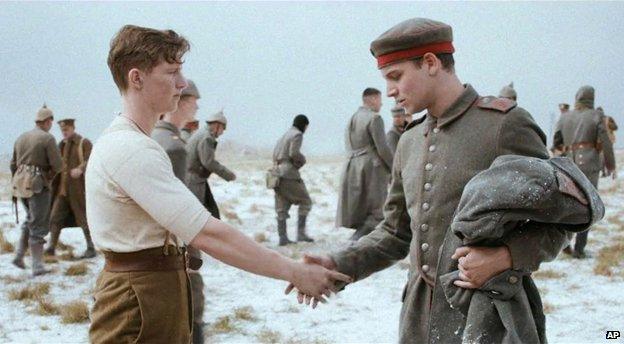
Christmas supermarket adverts used to show a paper-hatted extended family, lashings of mince pies, copious tinsel, and an inordinately large turkey. But this year's Sainsbury's offering rewinds 100 years to dramatise the Christmas truce of 1914, writes Tom de Castella.

No other part of this year's WW1 commemoration has puzzled me more.
I am at a loss to explain to my German readers how the foremost lobby group for service personnel in Britain could have approved of a supermarket's attempt to enlist the story of brave, indeed heroic soldiers for the profane task of selling more turkeys and puddings.
What we get, is a sanitised, terribly sentimental version of what happened in a number of places along the Western front: British, French and German soldiers decided to give World War One a break. Initially they were fulfilling a grim task - to bury their comrades whose bodies had been lying in no man's land, some for weeks or months. But then the gesture of respect for each other's dead developed into something more. For a day or two, in some places even well into the New Year, the men in uniform sang carols, met between the trenches, exchanged gifts and even played football. One source actually reports a match result - it was 3-2 to Germany, apparently.
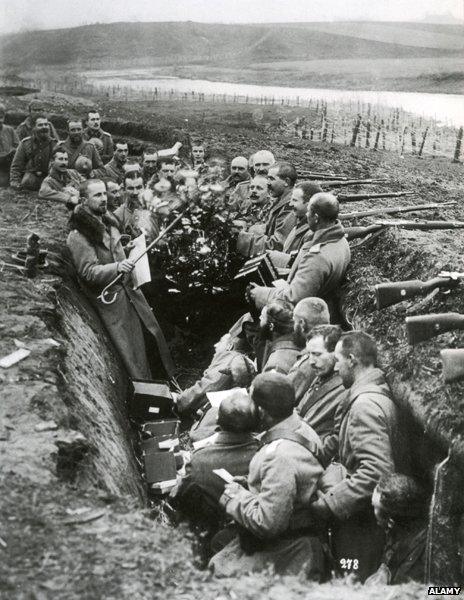
Undoubtedly, there is a great story to be told, and historians like Stanley Weintraub, American author of Silent Night, have done it in great detail. Ordinary soldiers plucked up the courage to go against their superiors' orders, a gesture of defiance in a miniature class war. On the German side the truce exposed regional differences. Most of the regiments taking part in the truce were from Saxony and Bavaria, proud regions uneasy about the Prussian domination of Germany. What united them with their adversaries on the other side was a working class view of the world, with "football as its religion", as Weintraub puts it.
There seems to have been a realistic view that the truce wouldn't hold much beyond Christmas. In his book The Small Peace in the Great War (Der kleine Frieden im grossen Krieg) the German author Michael Juergs describes soldiers from both sides secretly taking a good look at their opponents' positions, so as to be better able to kill them once the lull in the fighting was over. A British general, Walter Congreve VC, heard about the fraternisation but declined the invitation to have a look himself. "I thought they might not be able to resist a general," he wrote in a letter to his wife. In other words, he saw a realistic chance of being taken prisoner, or worse.

A Christmas kick-about?
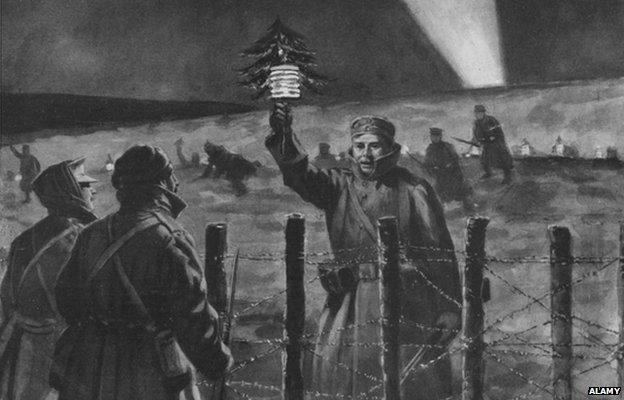

Clearly, the people involved were a lot less sentimental than those now idealising the war, from a distance of 100 years - or indeed attempting to identify their brand with it. Sainsbury's customers can buy a retro chocolate bar similar to the one in the film that the British Tommy, Jim, gives to his German pal, Otto. All proceeds go to the Royal British Legion.
Maybe the money will be used to help some of the injured soldiers who came back from Britain's latest foreign war? A very different, quite brilliant film, Kajaki, describes their plight. We learn a lot about the demeanour, behaviour and everyday language of ordinary soldiers, and grasp the esprit de corps that every good army needs and promotes - the unquestioning willingness to help and, if necessary, die for your mate. It is deeply moving. Yet, there is an utter futility to the incident at the heart of the film, in September 2006, which cost one man his life and five others at least one limb.
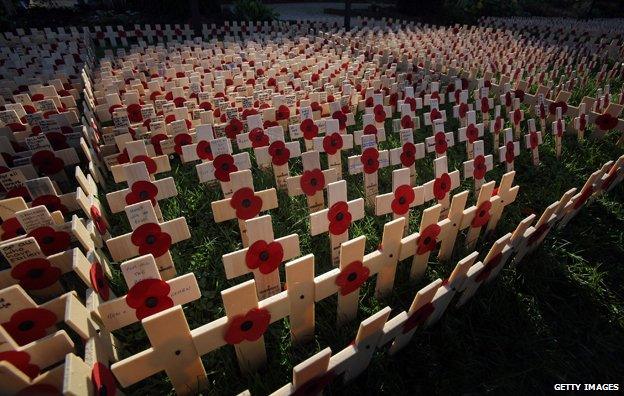
It reminded me of a visit to Wootton Bassett in November 2009, when the town still hosted the solemn repatriations of service people killed in Afghanistan. The ceremony for the victims was a wonderfully dignified occasion. But I was puzzled by all the civilians who kept saying to me: "This has got nothing to do with politics." Oh yes, it does, I was tempted to say. The crowds were honouring the fallen and giving comfort to their relatives. At the same time, not questioning the reason why these men had died meant tacit support for a war that, according to opinion polls even then, a majority of the British people wanted to end as soon as possible. When combat troops finally withdrew this autumn, the death toll stood at 453. Thousands remain alive with deep wounds, both visible and invisible. This is the reality of war. The syrupy slogan "Christmas is for sharing" doesn't even come close.
Sebastian Borger is the London correspondent for Berliner Zeitung. Read more from him here @sebastianborger, external.
Subscribe to the BBC News Magazine's email newsletter to get articles sent to your inbox